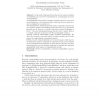Free Online Productivity Tools
i2Speak
i2Symbol
i2OCR
iTex2Img
iWeb2Print
iWeb2Shot
i2Type
iPdf2Split
iPdf2Merge
i2Bopomofo
i2Arabic
i2Style
i2Image
i2PDF
iLatex2Rtf
Sci2ools
111
click to vote
TCC
2005
Springer
2005
Springer
Comparing Two Notions of Simulatability
In this work, relations between the security notions standard simulatability and universal simulatability for cryptographic protocols are investigated. A simulatability-based notion of security considers a protocol π as secure as an idealization τ of the protocol task, if and only if every attack on π can be simulated by an attack on τ. Two formalizations, which both provide secure composition of protocols, are common: standard simulatability means that for every π-attack and protocol user H, there is a τ-attack, such that H cannot distinguish π from τ. Universal simulatability means that for every π-attack, there is a τ-attack, such that no protocol user H can distinguish π from τ. Trivially, universal simulatability implies standard simulatability. We show: the converse is true with respect to perfect security, but not with respect to computational or statistical security. Besides, we give a formal definition of a time-lock puzzle, which may be of independent interest. A...
Related Content
| Added | 28 Jun 2010 |
| Updated | 28 Jun 2010 |
| Type | Conference |
| Year | 2005 |
| Where | TCC |
| Authors | Dennis Hofheinz, Dominique Unruh |
Comments (0)

